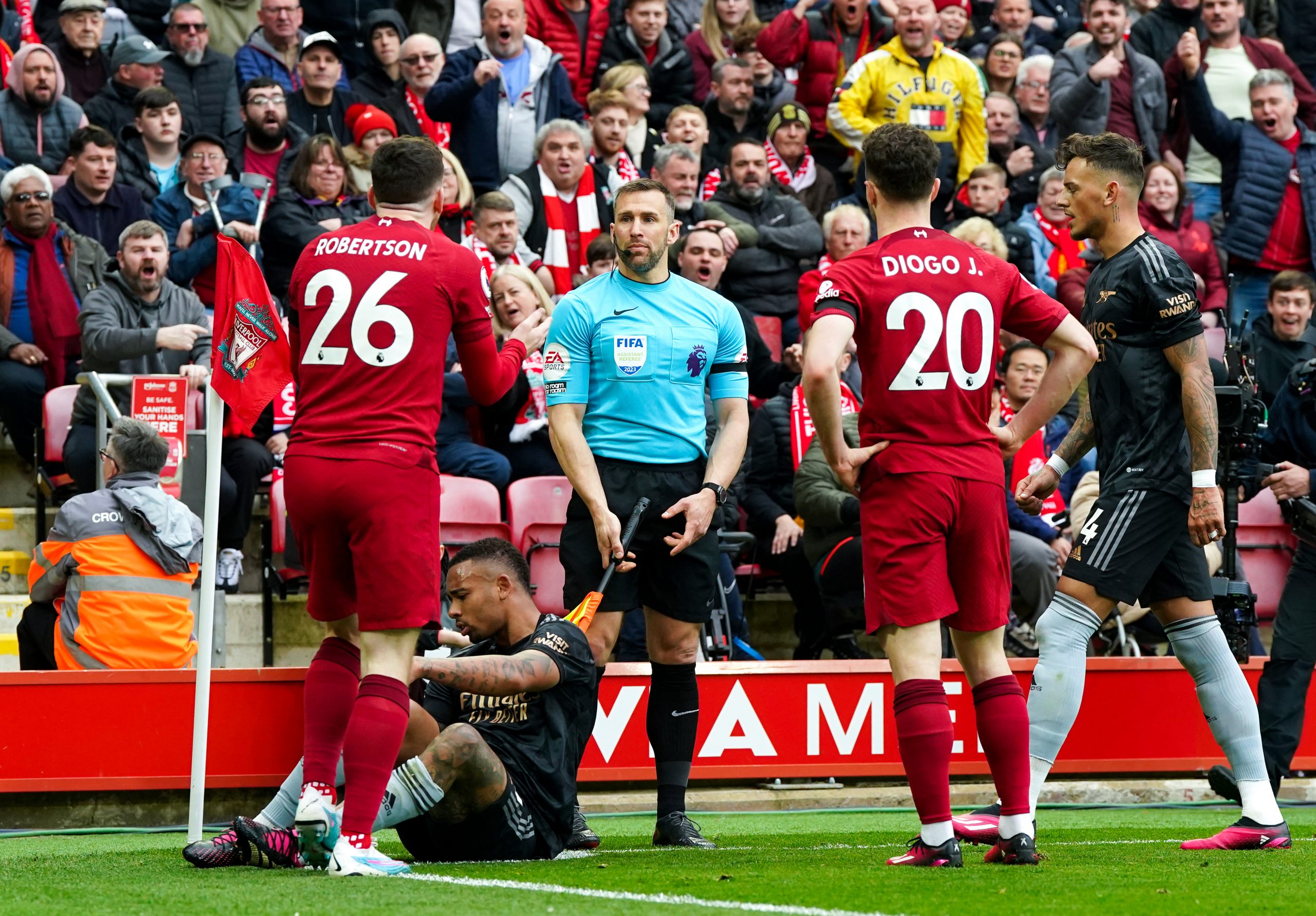Matchweek Moments: All Eyes on the PGMOL
By Ian Katan
The Professional Game Match Officials Limited (PGMOL) is the organization responsible for providing world-class referees to the English soccer pyramid. The group wants nothing more than to stay in the shadows and let attention from the fans fall on the glorious goals and saves they pay to see, but two massive incidents last weekend shined the spotlight directly on the PGMOL.
On Saturday, Brighton’s in-form winger Kaoru Mitoma should have earned a penalty after Pierre-Emile Hojbjerg crunched down on his foot in the box. No matter what angle the replay showed, Hojbjerg completely missed the ball and stomped on Mitoma’s standing leg. The tackle went to video review, yet somehow the video officials saw no infraction and Spurs escaped unpunished with a 2-1 win.
The Seagulls even had two other goals ruled out for tight handball calls that game, as well as a number of decisions all going against them. Though none of these decisions can be reversed after the game, the PGMOL sent an apology the next day to Brighton admitting that the call should have been a penalty. It’s the third time Brighton have received an apology for an incorrect decision this season, giving them every right to publicly demand better performances from the officials.
To make matters worse, at halftime during Arsenal’s draw on Sunday with Liverpool, assistant referee Constantine Hatzidakis appeared to elbow Andy Robertson in the chin. After the game, NBC Sports analyst Robbie Earle said, “that’s about a guy who will never referee or linesman in the Premier League again.”
The PGMOL quickly said it would collaborate with the FA and conduct its own investigation following the game, and on Thursday announced that Hatzidakis would not face a ban for the elbow. The potential double-standards surrounding contact between players and referees that this decision created has been loudly criticized in the days since. Players are not allowed to touch referees, and those who do are given swift and lasting bans, such as Aleksandar Mitrovic currently serving an eight game suspension for pushing a referee. If Robertson had been the one raising his elbow into Hatzidakis, a ban would’ve been guaranteed. The fact that Hatzidakis is unpunished when the roles are reversed creates inconsistency and potential hypocrisy.
The lack of a ban was likely due to the increasingly common act of players surrounding referees. Robertson approached Hatzidakis during halftime and got very close, making Hatzidakis’ elbow look more like a “get off of me” reaction to Robertson grabbing his arm rather than anything malicious. No matter whether there was any intent behind that elbow, and I have to think there wasn’t, it is still a massive error for an official to create that doubt given their responsibility for running the game fairly and safely. Players are taught to never give the referee the chance to make a decision against them, and that has to be the same for the officials. They simply cannot do anything that would create doubt.
Both incidents last weekend put all eyes on the PGMOL, which does not like to be the center of attention. Their job, along with the referees they oversee, is to let the game flow around them and only intervene quickly and methodically when absolutely necessary. An official’s best games are when no one notices their presence, instead focusing on the action of their favorite players and teams.
Former Premier League referee Howard Webb was brought in as the PGMOL’s Chief Refereeing Officer in 2022. Webb aimed to increase transparency for his organization’s decisions and to strive for unerring perfection that would keep his officials out of the spotlight. So far his time has been rocky, even beyond last weekend’s controversies forcing attention onto officials.
Pervis Estupinan had a goal incorrectly disallowed in Matchweek 23 because the VAR operator drew the line from the wrong defender. Chelsea and Conor Gallagher were in disbelief that same week after West Ham’s Tomas Soucek blocked a goalbound shot with his hand, but no penalty or card was given. Referee Lee Mason quit his job in February after he missed an offsides decision that allowed Brentford to wrongly equalize against Arsenal. And these are only a selection of the officiating blunders this campaign.
The PGMOL is responsible for training officials and demanding consistent perfection, so every error reflects as harshly on their organization as the official who made it. The Athletic explains that referees undergo intense preparation and oversight to keep their abilities at world-class levels, including constant training, analysis, monitoring, and reflection to maintain the required abilities. When so many wrong decisions are made in one season, these training standards must be revisited.
Mistakes often have bigger implications than just one game, like Brentford’s offsides equalizer which wrongly took two crucial points away from Arsenal’s pursuit of the league title. The Premier League cannot maintain its reputation as the best league in the world when officiating mistakes cause such significant impacts. Webb and the PGMOL hope that their rigorous standards will keep officials doing their jobs properly and not attracting attention for any errors. Mistakes like these, headlined by the two massive incidents last weekend, will keep referees exactly where they don’t want to be: in the spotlight.
